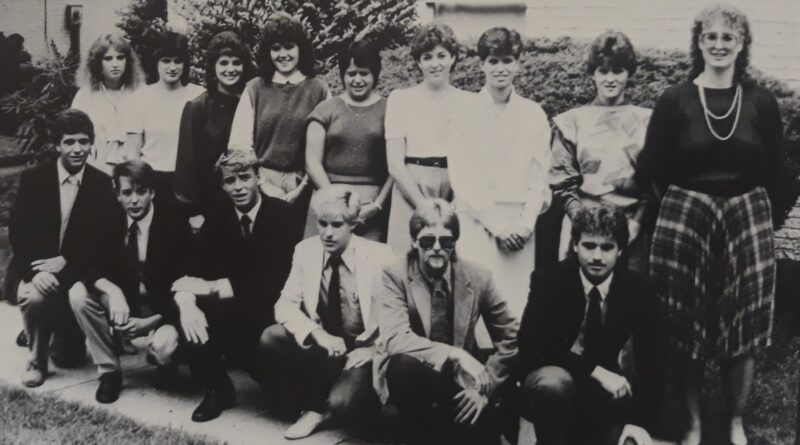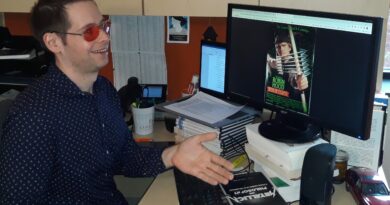You can dress ’em up – or can you?
Only if they are getting academic credit for it – once in awhile
Editor’s note: Corporate communications graduate Christine Fusselman wrote this story in September 2014 for a journalism course Professor Michael Lear-Olimpi taught. It is about a major change that came to Central Penn in the autumn of 2014. We thought it was an interesting look at changes at the college. Keep in mind that this story appears as it was written eight years ago, except for the photos that have been added for comparison. Linda Fedrizzi-Williams is president of Central Penn and some information in the story may no longer apply to places or people mentioned. Central Penn has not reinstituted a student dress code.
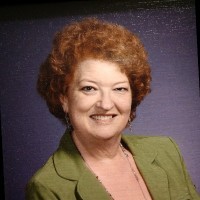
By Christine Fusselman
Special to The Knightly News
christine.fusselman@mymail.centralpenn.edu
Central Penn College has had a dress code for its students since it opened its doors in 1881, but that tradition ended Sept. 10 when President Karen M. Scolforo said the code was out, and “no ‘no’s’” was in.
A crowd of about 300 students, faculty and staff – assembled for the opening of the school’s new Underground student center – cheered when she announced the change, effective immediately.
For 133 years, the college expected its students to learn how to present themselves as professionals. That will continue, Scolforo said in her remarks, but students will no longer be required to wear ties, suit or sports coats, formal modest dresses or dress shoes.
“Dress and express yourself, as you see fit,” she said.
Still, students will continue, such as during special class presentations or job fairs, to dress “appropriately” for their intended careers or the general business world.
How it was
Through Central Penn’s history, the school’s students, mostly women, “dressed up” for school to prepare themselves for the working world. Although businesses have changed their appearance policies since 1881 to casual dress, Central Penn was slow to do so because of the school’s anchor in tradition.
“Society is changing,” Donna Booton, student accounts director, who has worked at Central Penn for 21 years, said prior to Scolforo’s announcement. “Dressing up is no longer as necessary in today’s world, be it in business, social occasions, church or just being out in public.”
Booton’s sentiment is echoed by many on and off campus. Society has become more casual in the workplace than it was in the past. The consensus was that Central Penn needed to change with the times, and do away with the student-appearance standard of professional dress clothes required by the dress code, which the school called The Appearance Policy.
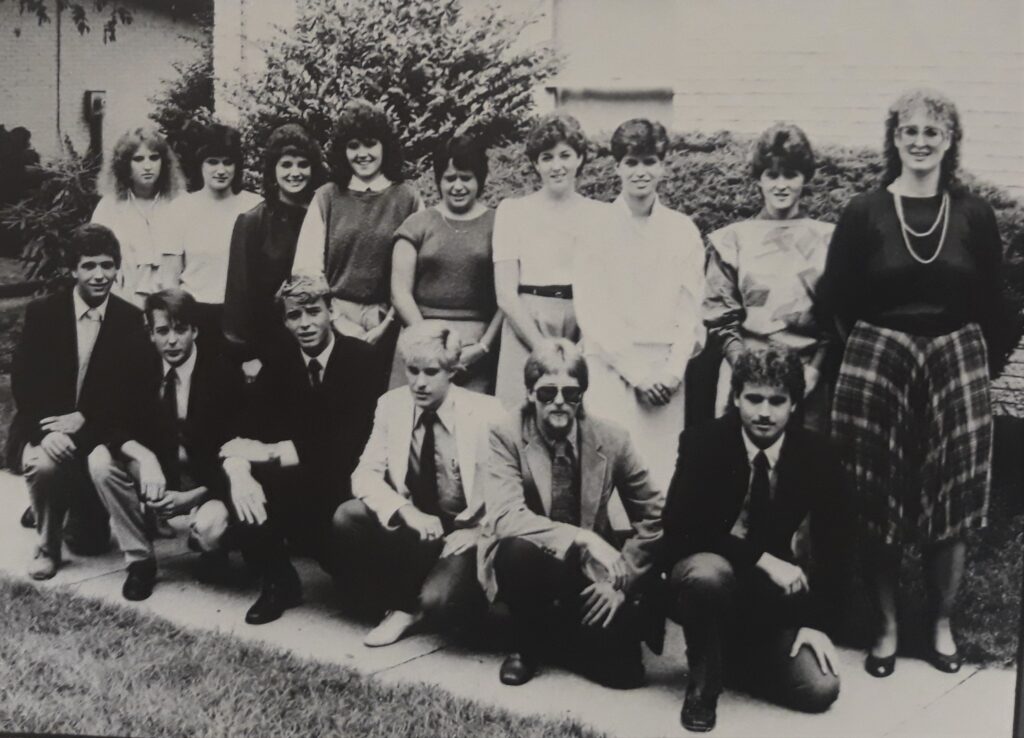
Photo courtesy Central Penn College
Central Penn faculty, staff and many students agree that students should learn how to dress appropriately when it is required, and those lessons will be incorporated into professors’ lessons at their discretion.
And although Central Penn has been among a minority of colleges that offer four-year degrees (it also offers two-year degrees) requiring a formal dress code for students, a few colleges in the Harrisburg area have long maintained appearance policies.
McCann School of Business and Technology, with seven locations in Pennsylvania, is one example. As did Central Penn, McCann, which began in 1867 as McCann School of Business, with a mission to train students primarily as accountants and secretaries, has dress code requirements based on students’ course of study. Part of McCann’s dress code states, “Students are expected to be neat, clean, and dressed consistently with the type of apparel that would be required in order to promote professionalism.”
Prior to the dress code change that Scolforo announced, Central Penn staffers would not point any fingers at who did not enforce the policy – a lack of consistency that has been a sore point between some faculty members and administrators at the school – but records show that only one student was reprimanded in the summer 2014 term, and only two in the spring, according to Sue Hartman, the student services employee who records appearance policy violations submitted about students by faculty and staff.
It came down to this, employees and students said: Students were confused about whether they needed to wear dress clothes, and what the term “business casual” meant. Several students pointed out that “business casual” describes a spectrum of dress and behavior that differ among businesses and schools. The appearance-policy guidelines are printed in the Central Penn Student Handbook, but many students have for many years disregarded those guidelines daily by wearing sweatpants, short skirts, sleeveless tops and jeans – dress that is now allowed.

Al-Raddahi is also wearing gym shorts and sneakers. She wore the outfit to class earlier in the day.
Photo by Michael Lear-Olimpi
“So, we’re trusting your judgment,” Scolforo said. “There’s no no’s on the list. We’re not going to tell you can’t wear shorts, you can’t wear pajamas.”
She said administrators and faculty care that students learn and prepare for careers.
What students and professionals say
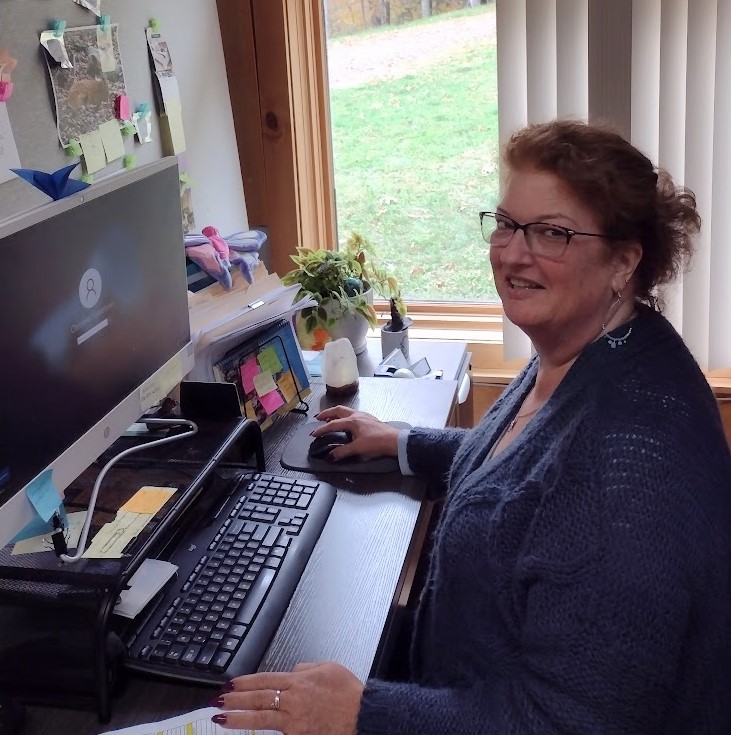
She remembers the Central Penn student Appearance Policy, from earning two degrees at the college.
Photo courtesy Christine Fusselman
Hannah Pursel, 22, of Mifflinburg, is an occupational therapy assistant student at Central Penn. She avoided the confusion of what clothes were allowed by sticking to the dress code of her major. Pursel, though, found no particular fault with the school’s dress code. She said dressing up makes people feel good about themselves, confident and “in the zone.”
Andrew Johnson, 22, of Harrisburg, a homeland security student, agreed. “It’s important to dress the part,” Johnson said. “Students should do what’s necessary to prepare for their career.”
Lisa Barr, 45, of Dover, York County, attended Central Penn in the late 1980s when it was officially a business school.
“I was studying retail management,” Barr said. “Dressing up for work was mandatory at that time. I appreciated the opportunity to build my wardrobe throughout my time at Central Penn.”
Barr works in an office that typically follows a business casual dress code, but said she is more tuned in to working when she’s in professional dress clothes.
So, why is it students did not abide by the policy? Sources speculate that lack of policy enforcement and students’ lack of money to buy the required clothing were the leading reasons. Central Penn’s on-campus population at its main location in Summerdale includes a large percentage of students who receive federal grants to attend school, and whose families cannot afford suits and similar professional-setting clothing.
Again, discretion plays an important role in how people should dress in different situations, which is why Central Penn faculty and other employees, such as members of the school’s Career Resources Center, will mention the importance of dressing appropriately for different situations.
Human resources professionals, for instance, expect applicants to wear business attire for job fairs, interviews and in their jobs, if it is required.
“Every day is a job interview,” human resources specialist Stephanie Hoke at Nationwide Insurance said in a phone interview. “Management will choose someone who is more professional.”
Hoke said that even in a business casual atmosphere such as at Nationwide, she has told employees that flip-flops are not acceptable footwear in a business office.
According to what the then-Central Pennsylvania Business School’s 1970 catalog describes as a “charm” course, “Graduates will get better jobs and earn more money, not only because of their business skills, but because they are expertly trained in proper makeup, fashion, poise and manners.”
At that time, this charm course was a requirement for all female students, who then formed the majority of Central Penn’s students.
The college has changed its programming over the years. New technology has affected curriculum by making some majors obsolete and forcing faculty and administrators to create others. Technology advancements have changed the way people communicate, inside and outside school, as well as the way people are getting their education. These new technologies offer students many advantages, but certain skills seem to be getting lost along the way, sources said.
One of the criticisms shared by Central Penn staff and by human resource professionals about students is weaknesses in communication skills.
Booton, the student accounts director, said some parents, and students, forget to introduce themselves on initial contact, either on the phone or in email.
Adds Keenan Knaub, a human resources generalist for FedEx Ground, good so-called soft skills – conversation, networking and writing short narrative such as letters and specific-message emails – are important when people apply for an internship or for full-time employment. Knaub stressed it is important to speak clearly and confidently, and to maintain eye contact.
Hoke, of Nationwide Insurance, advised that students should research businesses before going to an interview or to a job fair. Employers are impressed by people who know something about the business ahead of time, she said. She also noted the importance of dressing “nicely” and of being respectful.
After a position is earned, Hoke said, a new employee should do the follow-up. This means the employee should maintain a respectful attitude and continue to apply himself or herself. This makes employees seem more confident and allows growth, Hoke said, adding that the practice is a good one for every employee, but especially for inexperienced new hires, who may not be aware of the need for the practice, or may forget. Central Penn faculty including notes on such soft skills in classes – and the retention of these lessons in such offerings as the school’s Job Pursuit Seminar – will continue.
Clothes don’t make the man – or the woman
Central Penn no longer offers the charm course, but the college does provide career skill-building guidance, according to Steve Hassinger, director of career services.
Many of the soft skills important to employment can be practiced through mock interviewing, and by attending job fairs and networking events, as well as through diversity-appreciation programs such as the recent Festival of Nations, a celebration of ethnic and national pride that students staged on the Summerdale campus.
These soft skills can also be developed online, such as with webinars, a resume-building program, and a career- and education-planning tool – all provided for free by the college’s career services center.
The Job Pursuit Seminar course is another method Central Penn employs to encourage professionalism in its students and graduates. The course includes lessons on appropriate dress, resume-writing and job-application skills, and job research and mock interviews.
Central Penn’s required internships for traditional students and seminars called capstones for continuing-education students also help students build solid job skills.
These things, along with a degree earned at Central Penn, may lead to advanced positions for the college’s large population of online and nontraditional students who are employed, or to new employment for traditional students, sources interviewed for this story said.
Many changes have come to Central Penn since its beginning, and indications are that with change afoot, more will likely follow. Still, through all these changes, the professionalism of Central Penn students has been the school’s hallmark, employees and some students say.
It comes down to this, according to sources: Certain aspects of professionalism never change, such as good communication skills, good grooming, good manners, and respect for oneself and others, regardless of a student’s or a worker’s attire.
Fusselman was a founding student member of The Knightly News Media Club @ Central Penn College. She is a member of The Knightly News Media Club Hall of Fame. Fusselman earned her Bachelor of Science degree in corporate communications at Central Penn in 2016, and her associate degree in travel and tourism at Central Penn in 1988.
She is an administrative assistant at Winona Lakes Property Owners Association, in East Stroudsburg.
Comments or story idea? Contact KnightlyEditors@CentralPenn.Edu.
Edited by media-club co-adviser and blog editor Professor Michael Lear-Olimpi.

